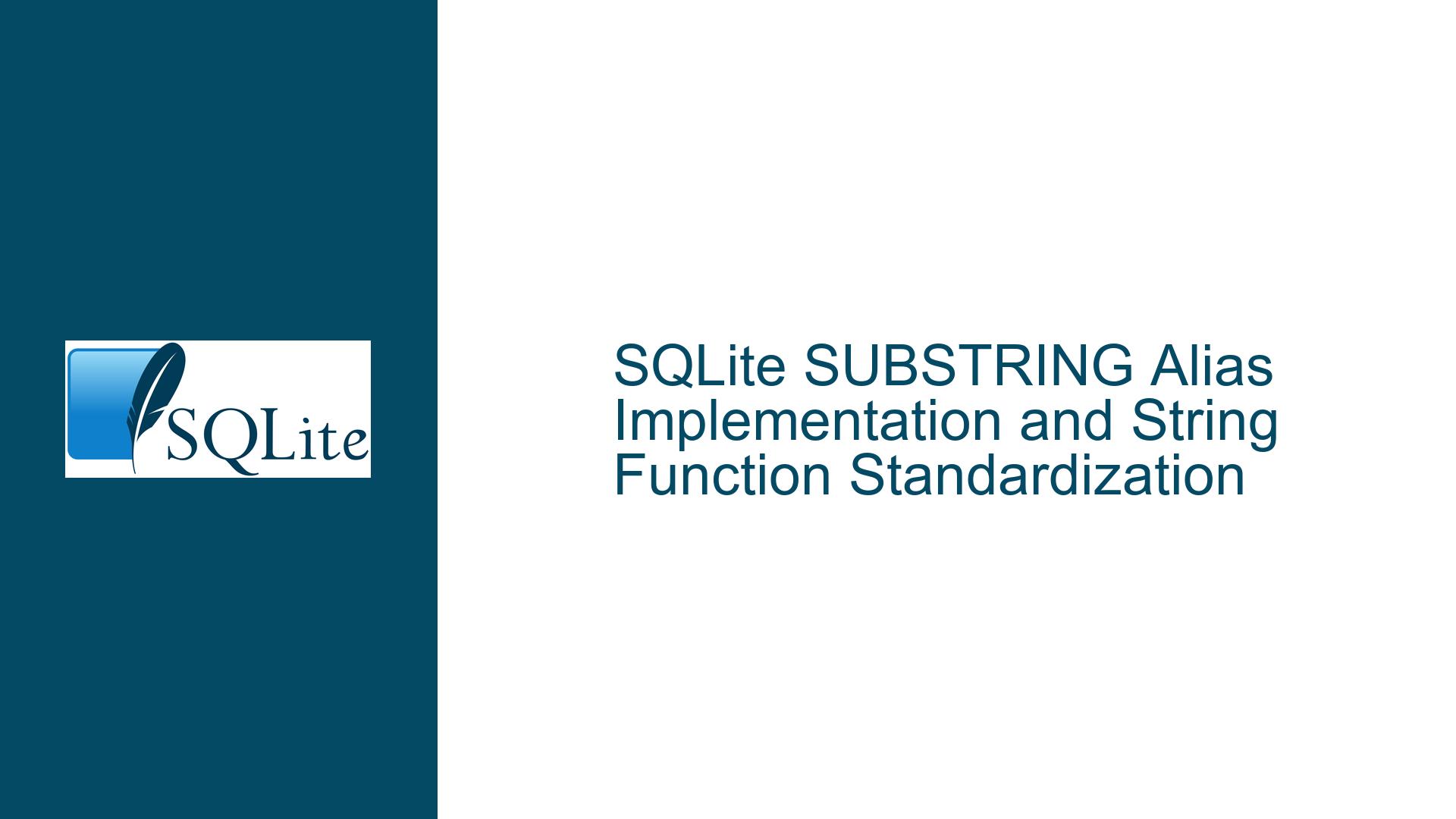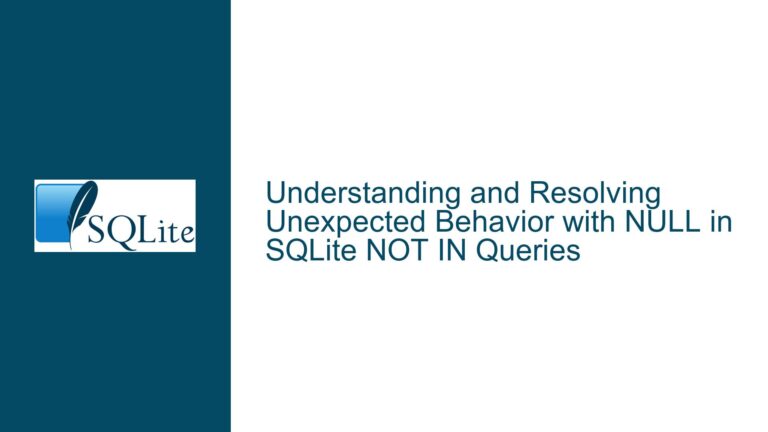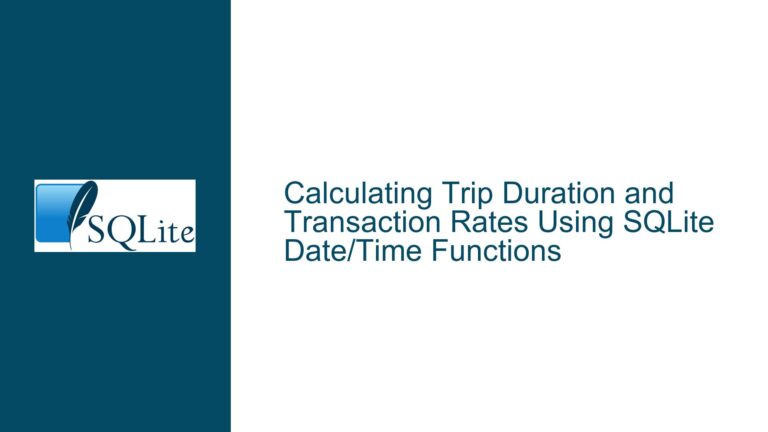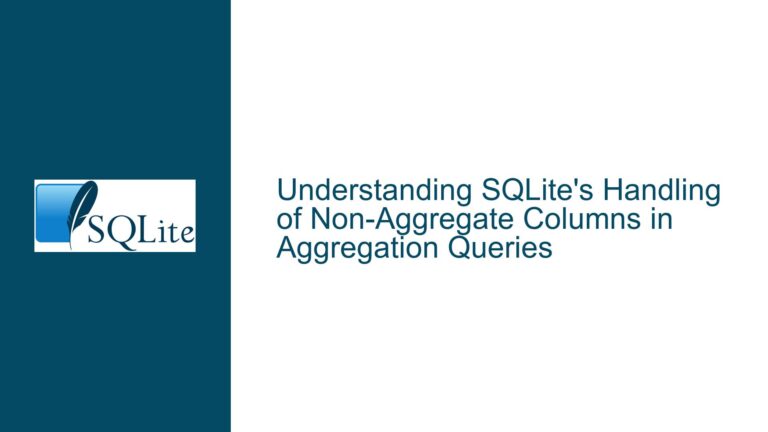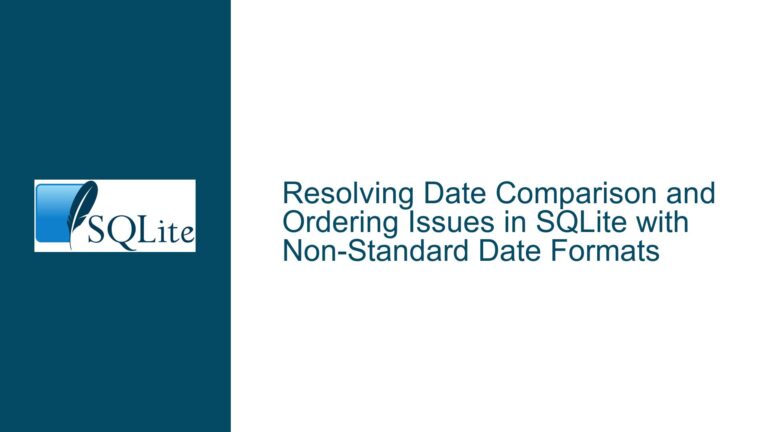SQLite SUBSTRING Alias Implementation and String Function Standardization
SQLite SUBSTRING Alias and ANSI Standard Compliance
The SQLite database management system has long been recognized for its lightweight, serverless architecture, making it a popular choice for embedded systems and mobile applications. However, one area where SQLite has historically diverged from other relational database management systems (RDBMS) is in its implementation of string functions, particularly the SUBSTR function. The discussion revolves around the proposal to add a SUBSTRING alias to the existing SUBSTR function in SQLite, aligning it more closely with the ANSI SQL standard and the implementations found in other major RDBMS like PostgreSQL, MySQL, Oracle, and SQL Server.
The SUBSTR function in SQLite is used to extract a substring from a given string, starting at a specified position and optionally for a specified length. The syntax in SQLite is SUBSTR(s, start [, length]), where s is the source string, start is the starting position, and length is the number of characters to extract. This syntax is consistent with Oracle but differs from the ANSI standard, which uses SUBSTRING(s FROM start [FOR length]). PostgreSQL and MySQL support both the ANSI standard and the shorter SUBSTRING(s, start [, length]) syntax, while SQL Server strictly adheres to the SUBSTRING(s, start, length) format.
The proposal to add a SUBSTRING alias to SQLite’s SUBSTR function is not merely a matter of syntactic sugar; it is a step towards greater portability and standardization across different database systems. This change would allow developers to write SQL queries that are more easily portable between SQLite and other RDBMS, reducing the need for conditional logic or query rewriting when migrating between systems. The change was implemented in SQLite Release 3.34.0, as noted in the discussion, marking a significant step towards SQLite’s alignment with the broader SQL ecosystem.
However, the discussion also highlights that the SUBSTRING alias is just one of several string functions where SQLite diverges from the ANSI standard. Other functions, such as POSITION, TRIM, CHAR_LENGTH, and OCTET_LENGTH, are implemented differently in SQLite compared to the standard and other RDBMS. For example, the POSITION function in the ANSI standard is used to find the position of a substring within a string, with the syntax POSITION(s2 IN s). SQLite, however, does not implement this function, requiring developers to use alternative methods to achieve the same result. Similarly, the TRIM function in SQLite does not fully support the ANSI standard’s optional LEADING, TRAILING, or BOTH keywords, which can lead to inconsistencies when porting queries from other systems.
The implications of these differences are significant for developers who work with multiple database systems. While the addition of the SUBSTRING alias is a positive step, the broader issue of SQLite’s divergence from the ANSI standard in other string functions remains a challenge. This divergence can lead to increased complexity in query writing, reduced portability, and potential errors when migrating queries between systems. The discussion also touches on the fact that Oracle and SQL Server do not fully implement these ANSI standard functions either, which further complicates the landscape for developers seeking to write portable SQL code.
Impact of Non-Standard String Functions on Query Portability
The divergence of SQLite’s string functions from the ANSI standard has a direct impact on the portability of SQL queries across different database systems. Portability is a critical concern for developers who need to ensure that their applications can run on multiple database backends without requiring significant modifications to the SQL code. The lack of standardization in string functions can lead to several issues, including increased development time, higher risk of errors, and reduced maintainability of the codebase.
One of the primary challenges is the need for conditional logic or query rewriting when migrating queries between systems. For example, a query that uses the ANSI standard SUBSTRING(s FROM start [FOR length]) syntax will not work in SQLite without modification. Developers must either rewrite the query to use SQLite’s SUBSTR(s, start [, length]) syntax or use conditional logic to generate the appropriate query based on the target database. This adds complexity to the codebase and increases the risk of introducing errors during the migration process.
The impact of non-standard string functions is not limited to the SUBSTRING function. Other functions, such as POSITION, TRIM, CHAR_LENGTH, and OCTET_LENGTH, also present challenges for query portability. For instance, the POSITION function, which is used to find the position of a substring within a string, is not implemented in SQLite. Developers must use alternative methods, such as the INSTR function, to achieve the same result. However, the INSTR function in SQLite has a different syntax and behavior compared to the ANSI standard POSITION function, which can lead to inconsistencies and errors when porting queries.
The TRIM function in SQLite also diverges from the ANSI standard, which supports optional LEADING, TRAILING, or BOTH keywords to specify which part of the string to trim. SQLite’s TRIM function does not support these keywords, requiring developers to use additional logic to achieve the same result. This can lead to more complex and less readable queries, as well as potential errors if the developer is not aware of the differences between the systems.
The CHAR_LENGTH and OCTET_LENGTH functions, which are used to determine the length of a string in characters or bytes, respectively, also differ between SQLite and the ANSI standard. While SQLite does implement these functions, their behavior may not be consistent with other RDBMS, particularly when dealing with multi-byte character sets or Unicode strings. This can lead to discrepancies in query results when migrating between systems, particularly in applications that rely on precise string manipulation.
The broader issue of non-standard string functions in SQLite is compounded by the fact that other major RDBMS, such as Oracle and SQL Server, also do not fully implement the ANSI standard functions. This creates a fragmented landscape where developers must navigate a patchwork of different implementations and syntaxes, making it difficult to write truly portable SQL code. The discussion highlights the need for greater standardization across database systems, particularly in the area of string functions, to reduce the complexity and risk associated with query portability.
Strategies for Handling SQLite’s Non-Standard String Functions
Given the challenges posed by SQLite’s non-standard string functions, developers must adopt strategies to mitigate the impact on query portability and maintainability. These strategies include using conditional logic to generate database-specific queries, creating custom functions to emulate ANSI standard behavior, and leveraging third-party libraries or tools to abstract away the differences between database systems.
One approach is to use conditional logic in the application code to generate database-specific queries based on the target system. This can be done by detecting the database type at runtime and constructing the appropriate query syntax accordingly. For example, if the target database is SQLite, the application can use the SUBSTR function, while for other databases, it can use the SUBSTRING function. This approach allows developers to write portable SQL code that adapts to the specific requirements of each database system. However, it also adds complexity to the application code and requires careful testing to ensure that the correct queries are generated for each system.
Another strategy is to create custom functions in SQLite that emulate the behavior of ANSI standard string functions. For example, a custom POSITION function can be implemented using SQLite’s INSTR function, with the appropriate adjustments to match the ANSI standard syntax and behavior. Similarly, a custom TRIM function can be created to support the LEADING, TRAILING, and BOTH keywords. These custom functions can be defined using SQLite’s CREATE FUNCTION statement, allowing developers to write queries that are more consistent with the ANSI standard. However, this approach requires additional development effort and may not be feasible for all applications, particularly those with strict performance requirements.
Third-party libraries or tools can also be used to abstract away the differences between database systems and provide a consistent interface for querying different databases. For example, Object-Relational Mapping (ORM) libraries like SQLAlchemy or Hibernate can be used to generate database-specific SQL queries based on a high-level, database-agnostic API. These libraries often include built-in support for handling differences in string functions and other SQL syntax, reducing the burden on developers to write database-specific code. However, using ORM libraries may introduce additional complexity and overhead, particularly for applications that require fine-grained control over the generated SQL queries.
In addition to these strategies, developers should also consider the broader context of their application and the specific requirements of their use case. For example, if the application is primarily targeted at SQLite and portability is not a major concern, it may be acceptable to use SQLite’s native string functions without attempting to emulate the ANSI standard. On the other hand, if the application needs to support multiple database systems, it may be worth investing in the development of custom functions or the use of third-party libraries to ensure consistent behavior across systems.
Ultimately, the choice of strategy will depend on the specific needs and constraints of the application, as well as the resources available for development and maintenance. By carefully considering the impact of SQLite’s non-standard string functions and adopting appropriate strategies to handle them, developers can reduce the complexity and risk associated with query portability and ensure that their applications are robust and maintainable across different database systems.
Conclusion
The addition of the SUBSTRING alias to SQLite’s SUBSTR function in Release 3.34.0 is a positive step towards greater standardization and portability in SQLite. However, the broader issue of SQLite’s divergence from the ANSI standard in other string functions remains a challenge for developers who need to write portable SQL code. The impact of these differences on query portability, development time, and maintainability cannot be understated, particularly in applications that need to support multiple database systems.
To mitigate these challenges, developers must adopt strategies such as using conditional logic to generate database-specific queries, creating custom functions to emulate ANSI standard behavior, and leveraging third-party libraries or tools to abstract away the differences between database systems. By carefully considering the specific requirements of their application and the resources available for development, developers can navigate the complexities of SQLite’s non-standard string functions and ensure that their applications are robust and maintainable across different database systems.
The discussion highlights the need for greater standardization across database systems, particularly in the area of string functions, to reduce the complexity and risk associated with query portability. While SQLite has made progress in aligning with the ANSI standard, there is still work to be done to ensure that developers can write truly portable SQL code that works seamlessly across all major RDBMS. As the database landscape continues to evolve, it is essential for developers to stay informed about the latest developments and best practices in SQL standardization and portability.
